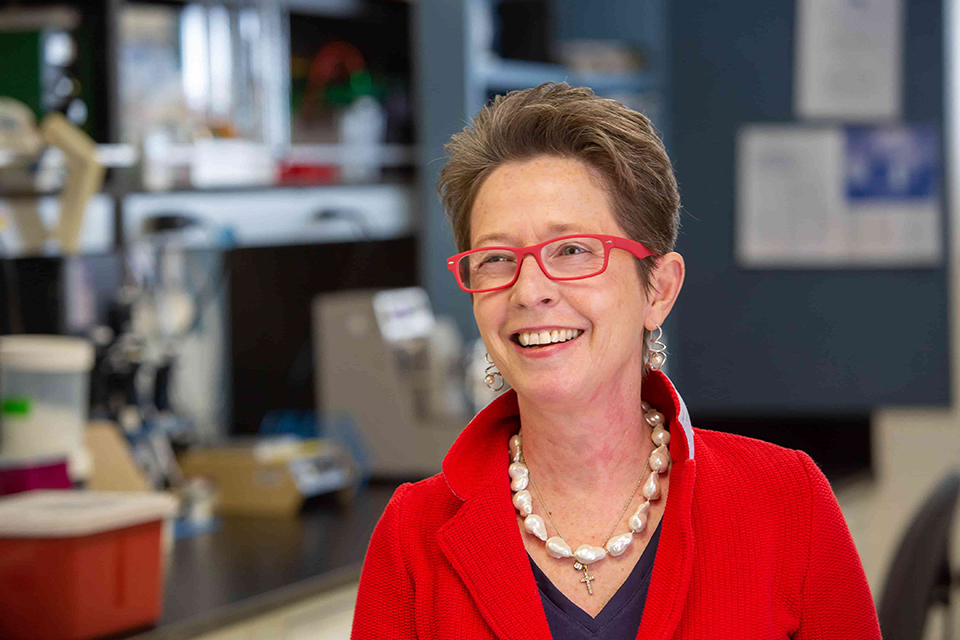SLU Startup Raises $30 Million in Bid to Better Manage Pain
Carrie Bebermeyer
Public Relations Director
carrie.bebermeyer@slu.edu
314-977-8015
Reserved for members of the media.
In one of the biggest investments in research commercialization in Saint Louis University’s history, BioIntervene, a biopharmaceutical company founded in 2014 by Saint Louis University (SLU) pharmacologist Daniela Salvemini, Ph.D., has raised $30 million in series A funding from MPM Capital. The investment will propel Salvemini’s discoveries forward and set the stage to begin Phase I clinical trials for a new non-addictive pain-killer later this year.
In addition to advancing the company’s program through human proof-of-concept studies in neuropathic pain, the proceeds of the financing also will be used to advance its portfolio of drug candidates -- A3 adenosine receptor (A3AR) agonists -- for a potentially broad range of chronic inflammatory and neurodegenerative indications.
Salvemini, who is professor of pharmacology and physiology and director of the Henry and Amelia Nasrallah Center for Neuroscience at SLU, pioneered research on a treatment for neuropathic pain that could provide the first alternative to ineffective steroids and addictive opioids, a market projected to reach $8.3 billion by 2024.
Neuropathic pain affects between 15 and 20 million people in the U.S. Exceedingly difficult to treat, this type of pain can occur after injuries to the nervous system due to trauma, disease or exposure to neurotoxins, including after chemotherapy. There is a desperate need for new medications that do not cause side effects and addiction the way narcotic pain killers do.
“After dedicating many years to exploring the role of this pain pathway, I am very excited that the program through this funding now has the resources and leadership to advance our lead candidate into the clinic for neuropathic pain,” said Salvemini. “Having the opportunity to translate one’s discoveries from the bench to the bedside is a dream come true. I am hopeful that our efforts will lead to the alleviation of suffering while helping end the opioid crisis.”
Salvemini discovered that alterations in adenosine signaling within the body at the A3 adenosine receptor contribute to the development of chronic pain states and that compounds that target the A3 adenosine receptor (A3AR) can “turn off” pain signals, providing relief from chronic pain of various types. Her work also revealed contribution of this receptor in neurodegenerative diseases.
This discovery, she noted, provided the starting point of her collaboration with Kenneth Jacobson, Ph.D., Chief of the Molecular Recognition Section, in the Laboratory of Bioorganic Chemistry at the National Institutes of Health (NIH).
“Our fruitful collaboration over the years included the synthesis of highly selective A3AR agonists, one of which BioIntervene is now advancing to clinical trials,” Salvemini said.
"It is hard to overstate the significance of this investment in BioIntervene. Dr.
Salvemini's work on non-addictive treatments for chronic pain has the potential to
dramatically curb the deadly effects of our nation's ongoing opioid crisis, and this
investment will greatly enhance BioIntervene's ability to pursue this transformative
work," said Ken Olliff, vice president for research at SLU. "This investment also
shows that as the St. Louis region continues to emerge as a national hub for innovation,
Saint Louis University will continue to grow into a major destination for student
and faculty entrepreneurs and research discoveries."
Read more about how SLU researchers are helping address the opioid epidemic here.
Saint Louis University School of Medicine
Established in 1836, Saint Louis University School of Medicine has the distinction of awarding the first medical degree west of the Mississippi River. The school educates physicians and biomedical scientists, conducts medical research, and provides health care on a local, national and international level. Research at the school seeks new cures and treatments in five key areas: cancer, liver disease, heart/lung disease, aging and brain disease, and infectious diseases.
The Henry and Amelia Nasrallah Center for Neuroscience at Saint Louis University
As a pioneering leader in the field, the Center advances neuroscience research, education, clinical care and outreach activities across Saint Louis University and the broader St. Louis community, advancing SLU researchers' discoveries in the field of neuroscience that will have a major impact in patient care and in society.
BioIntervene
BioIntervene, Inc. is a preclinical-stage biopharmaceutical company committed to the discovery and development of effective and non-addictive medicines for chronic pain and other chronic inflammatory and neurodegenerative disorders. The Company was founded in 2014 based on insights from research at Saint Louis University and the National Institutes of Health (NIH). BioIntervene’s founding team has pioneered the understanding of adenosine A3 receptor biology, with a focus on developing first-in-class, selective adenosine A3 receptor agonists. For more information, please visit www.biointervene.com.
The content in this release is the sole responsibility of the authors and does not necessarily represent the official views or imply endorsement of the National Institutes of Health.


















